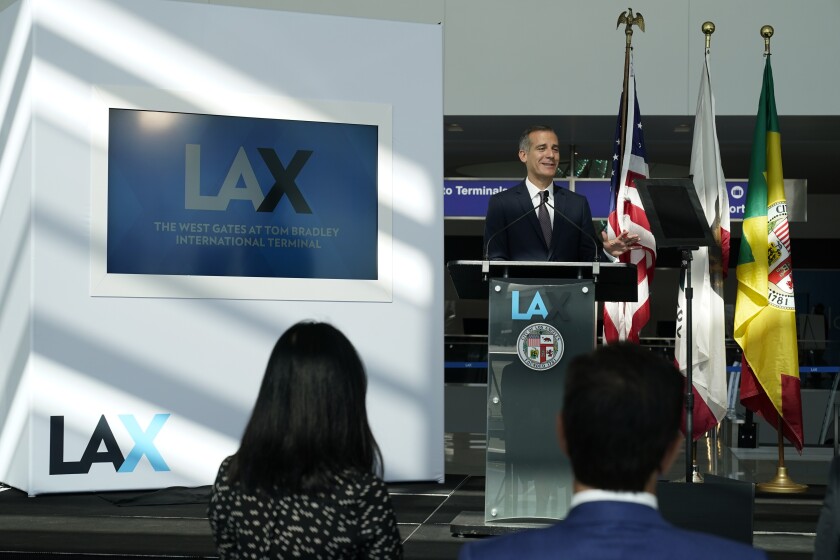A $1.7-billion expansion project at Los Angeles International Airport was officially unveiled Monday by local officials who expressed optimism that the facility will soon help serve a resurgence of travel demand after the yearlong pandemic slump.
The new facility, named West Gates and billed as an expansion of the Tom Bradley International Terminal, holds 15 gates. Travelers access it from a preexisting part of the Bradley terminal by heading west through a 1,000-foot-long tunnel that burrows under two taxiways.
A traveler walks through the passenger tunnel at Los Angeles International Airport’s new West Gates facility.
(Ashley Landis / Associated Press )
The project broke ground in 2017, when international travel was surging, particularly with big-spending visitors from China. At the time, the airport was the second-busiest in the nation and was considered the West Coast gateway to the United States. The airport served more than 84 million domestic and international travelers that year, according to LAX records.
The COVID-19 pandemic and resulting restrictions imposed on international trips pushed demand for air travel into a slump. Last year, LAX served only 29 million travelers.
Several airlines began using the new facility about three weeks ago. Los Angeles Mayor Eric Garcetti hosted a grand reopening ceremony Monday to unveil the project to news outlets, city officials and local community leaders.
After the ceremony, Garcetti said he is hopeful that travel demand will rebound enough to justify the construction. Domestic travel at the airport recently has been at about 55% of pre-pandemic levels, with international tourism at about 30%, according to airport data.

Los Angeles Mayor Eric Garcetti speaks at a ceremony to officially unveil the new LAX facility.
(Ashley Landis / Associated Press )
“If the last couple of months are any indicator, we are going to be gangbusters soon,” he said. “I think people have saved money, they’re stir-crazy from staying at home, and they want to see family and friends and seek new experiences.”
Justin Erbacci, chief executive of Los Angeles World Airports, noted that domestic travel demand has briefly reached as high as 70% of pre-pandemic levels on recent weekends.
The West Gates facility was built to help increase the airport’s capacity and reduce the crowding of travelers that was common before the pandemic. Two of the gates will serve the largest commercial aircraft, such as the Boeing 747-8 and the Airbus A380.
Garcetti said he has suggested adding three new terminals, two for passengers and one for cargo. The extra terminals and the ongoing modernization effort at LAX, he said, would help serve what he hopes will be an increase in visitors to Los Angeles while easing the airport’s notorious traffic and congestion problems.
The West Gates facility, part of a multiyear, $15-billion modernization of the airport, was initially expected to be completed in 2019. The modernization effort includes the Bradley terminal’s $2.1-billion remodel and expansion completed nearly eight years ago. It also includes plans for a people mover that will connect the airport terminals to the region’s rail system and to a centralized rental car facility. The entire effort is expected to be completed by 2023.
The 750,000-square foot West Gates facility includes boarding areas that use facial-recognition technology to identify passengers and a new checked-bag storage and processing system. The new gates serve Air Tahiti, Allegiant, El Al, Frontier, Sun Country, Viva and Volaris airlines, with several more carriers expected to be added in June.
A nearly three-story-tall glass chandelier hangs from the middle of the new concourse, adorned with LED lights that can be programmed to change colors and strobe on and off in various sequences.

Passengers wait for their flights at LAX’s West Gates facility.
(Ashley Landis / Associated Press)
The $261-million baggage storage and processing system moves luggage between the main part of the Bradley terminal and the West Gates facility through a tunnel. Luggage is placed in yellow bins that have embedded radio frequency transmitters and are sorted by robotic arms and moved along conveyor belts and rollers to help ensure the luggage doesn’t get lost. The system can store as many as 2,400 bags for several hours before the luggage needs to be loaded into a departing plane. In the rest of the airport, tags with bar codes are used to keep track of luggage, but such tags can get damaged or come loose.
San Francisco International Airport is the only other airport in the country that uses such radio-frequency technology for the luggage process, airport officials said.
The West Gates facility also features a ramp tower, where airport employees can monitor and guide airplanes moving from the gates to the runways. The tower will also serve as a backup to the air traffic control tower operated by the Federal Aviation Administration.
Philippine Airlines has protested LAX’s plan to have the airline’s future flights use the new gates, saying the distance between the facility and the preexisting part of the Bradley terminal is too long for many of the airline’s elderly passengers.
The airline issued an advisory to its passengers, apologizing for the “inconvenience of the airport’s decision” and noting that the carrier “appealed urgently to the airport authority to reconsider.”
LAX officials said that the connecting tunnel features moving walkways, escalators and elevators and that passengers who need assistance can request an electric cart to use in the tunnel.





